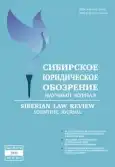Конституционные ценности в содержании государственных программ Российской Федерации
- Авторы: Суханова А.А.1
-
Учреждения:
- Челябинский государственный университет
- Выпуск: Том 19, № 1 (2022)
- Страницы: 39-53
- Раздел: КОНСТИТУЦИОННОЕ ПРАВО, КОНСТИТУЦИОННЫЙ СУДЕБНЫЙ ПРОЦЕСС, МУНИЦИПАЛЬНОЕ ПРАВО (архивный раздел)
- Статья опубликована: 04.05.2022
- URL: https://bakhtiniada.ru/2658-7602/article/view/349717
- DOI: https://doi.org/10.19073/2658-7602-2022-19-1-39-53
- EDN: https://elibrary.ru/BEJTSA
- ID: 349717
Цитировать
Полный текст
Аннотация
Конституция Российской Федерации в полной мере исполняет свое ценностное назначение только тогда, когда ее положения находят свое реальное воплощение в общественно-политических отношениях. В данном контексте высокую степень значимости приобретает процесс реализации Конституции и ее аксиологических положений, выступающий предметом настоящего исследования. Методологической основой исследования является совокупность таких научных методов, как: формально-юридический и структурно-функциональный, сравнения, поиска и анализа научного и нормативного материала. В качестве научной базы проведенного исследования выступили работы выдающихся ученых в сфере теории права и конституционного права. Применительно к реализации конституционных ценностей в государственных программах Российской Федерации особый смысл приобретают такие свойства Основного Закона, как реальность, прямое действие и программный характер. Кроме того, в исследовании реализации конституционных ценностей в содержании государственных программ Российской Федерации существенное научное и практическое значение приобретает вопрос о формах реализации соответствующих конституционных предписаний. Особыми формами реализации конституционных ценностей в содержании государственных программ выступают: отражение в ключевых аспектах содержания государственной программы (цели, задачи, направления) положений, развивающих идеи той или иной конституционной ценности, а также конкретизация конституционных ценностей в содержании государственных программ Российской Федерации. Для реализации конституционных ценностей в содержании государственных программ существенное значение имеют сложившаяся историческая ситуация, особенности действующего правового режима, характер международных отношений и пр. Глобальной целью реализации конституционных ценностей в государственных программах Российской Федерации является общественный прогресс и стабильное развитие Российского государства как демократического, социального и правового. Степень приближения общества и государства к указанной цели выступает критерием эффективности рассматриваемой реализации. Основные положения настоящей исследовательской работы и ключевые выводы, сделанные по ее результатам, могут выступать основой для дальнейших научных изысканий, затрагивающих вопросы, связанные с реализацией конституционных ценностей как в содержании государственных программ, так и в иных формах, а также вопросы, связанные с функционированием механизма такой реализации.
Об авторах
Александра Андреевна Суханова
Челябинский государственный университет
Автор, ответственный за переписку.
Email: saa1908@yandex.ru
ORCID iD: 0000-0003-2961-8835
SPIN-код: 9737-9089
старший преподаватель кафедры конституционного права и муниципального права, старший преподаватель кафедры прокурорского надзора и организации правоохранительной деятельности
Россия, ул. Бр. Кашириных, 129, Челябинск, 454001Список литературы
- Pfersmann O. Unconstitutional Constitutional Amendments: a Normativist Approach // Zeitschrift für öffentliches Recht. 2012. Vol. 67. S. 81-113. https://doi.org/10.1007/s00708-012-0130-x
- Лучин В. О. Конституция Российской Федерации. Проблемы реализации. М. : ЮНИТИ-ДАНА, 2015. 688 с.
- Лебедев В. А. Человек, его права и свободы как высшая конституционная ценность // Проблемы права. 2013. № 4 (42). С. 8-17.
- Мальцев Г. В. Социально-экономические права и свободы граждан СССР и их гарантии // Советское государство и право. 1983. № 2. С. 115-123.
- Керимов Д. А. Философские проблемы права : моногр. М. : Мысль, 1972. 472 с.
- Морозова Л. А. Конституционное регулирование в СССР. М. : Юрид. лит., 1985. 144 с.
- Тихомиров Ю. А. Конституционные правоотношения // Теоретические основы Советской Конституции / отв. ред. Б. Н. Топорнин. М. : Наука, 1981. С. 140-148.
- Братусь С. Н. Юридическая ответственность и законность. М. : Юрид. лит., 1976. 216 с.
- Гревцов Ю. И. Прямое действие Конституции? // Журнал российского права. 1998. № 6. С. 94-99.
- Democratizing Constitutional Law / ed. by T. Bustamante, B. G. Fernandes. Cham : Springer International Publishing, 2016. 328 p. https://doi.org/10.1007/978-3-319-28371-5.
- Самощенко И. С. Непосредственное действие Конституции // Советское государство и право. 1981. № 3. С. 26-35.
- Микерин А. А. К вопросу об эффективности конституционного регулирования в современной России // Вестник Казанского юридического института МВД России. 2013. № 4 (14). С. 22-25.
- Киреев В. В. Принципы конституционной реформы: проблемы детерминации // Вестник Челябинского государственного университета. Сер.: Право. 2008. № 2 (103). Вып. 14. С. 5-9.
Дополнительные файлы












































